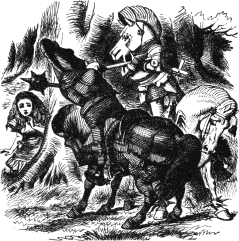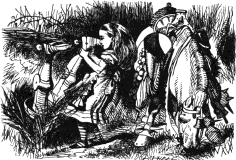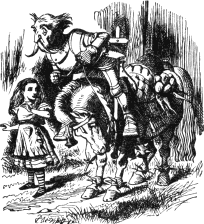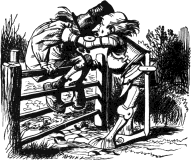It's My Own Invention
Studies in Alice XXII, by Marc Edmund JonesThis lesson considers the eighth chapter of Through the Looking-Glass and the twenty-second great principle of wisdom in the Philosophy of Concepts as revealed through the adventures of Alice is that the manner of doing something is more important than the thing itself. This one of the very vital points of the conceptual philosophy as first developed in the Ibn Gabirol series and now used by the group to determine all policy in reference to individual conduct. Gradually the students have grown to the point of realizing that the conventions in life are the basis of consciousness and that without the set or proper order in the doing of things there would be no degree of awareness possible beyond the simplest and most animal gratifications of appetite. In the ninth lesson of the Alice studies the fact that morals and ethics are a matter of fashion was brought out as a foundation on which this further consideration can be built. Since conduct gains value and loses value in contrast with idea, as there shown, it becomes obvious to the philosophical mind that reality in all conduct is the idea underlying it and any proper estimation of human acts must be in light of the ideas that influence and support them. Superficially, this would seem to indicate that acts themselves are unimportant, but this is only in principle since an act of itself is merely an inconsequential ripple on a sea of manifestation from a material or outer point of view but nevertheless is of supreme importance as an indication of an intelligence or purpose that has brought it into being. In the ninth lesson the student was called on to subject his conduct to the measure of idea or to learn to justify each act. Now he is called on to realize that the act itself is important only as an objectifying agency and it is the attitude or idea with which he surrounds each manifestation of himself that is of real moment. Conduct must first be made responsible in its nature. Then and only then can idea be made supreme over conduct. A man must learn to respect himself first before he can become a gentleman. Things to the evolved man are valuable as symbols and as he is able to see these as ideas in and through all he becomes superior to manifestation for the first time.
 Here is the principle of law. There are rules of battle at
every stage of being and it is these rules, laws or
principles that are the structure of consciousness or the
grooves in the general sustaining awareness of all that
makes individual development possible. Man rises
supreme over life but not by holding himself superior to
law. Superiority to law or orderliness is the foundation
of all destructiveness or chaos. It is anarchy in its
conventional sense. He must learn to manipulate the
idea that sustains conduct and so make law or the
conventions of life his true and faithful servants. The
symbolism of the chapter is interesting in bringing out
the principles of orderliness in rather joyous fashion by
showing the constant tumbling of the soldiers and indeed
of every important character in this chapter.
Here is the principle of law. There are rules of battle at
every stage of being and it is these rules, laws or
principles that are the structure of consciousness or the
grooves in the general sustaining awareness of all that
makes individual development possible. Man rises
supreme over life but not by holding himself superior to
law. Superiority to law or orderliness is the foundation
of all destructiveness or chaos. It is anarchy in its
conventional sense. He must learn to manipulate the
idea that sustains conduct and so make law or the
conventions of life his true and faithful servants. The
symbolism of the chapter is interesting in bringing out
the principles of orderliness in rather joyous fashion by
showing the constant tumbling of the soldiers and indeed
of every important character in this chapter.
 The fall of man is the basis of evolution in all spiritual
teaching and whereas the fall may be variously
interpreted by the different schools of thought it is
standardized in proper emphasis here brought out that the
details of any descent into objective experience are
without significance in comparison with man's separation
from his divine source and his loss therefore of that sense
of law and order that marks the spiritual soul. The
Luciferian rebellion in Heaven and the Adamesque
violation of instructions in Eden alike mark an outer emphasis on fact and act at the expense of
an inner understanding of the sustaining idea. It is curious in this chapter to see how frequently
each fall is on the head or is a matter of mental understanding and to note also that the horses in
every instance are quiet since the horse eternally represents the senses and the senses therefore
are depicted correctly here as passive agencies in the degeneracy of men or obedient in
permitting his mounting and dismounting of sensation.
The fall of man is the basis of evolution in all spiritual
teaching and whereas the fall may be variously
interpreted by the different schools of thought it is
standardized in proper emphasis here brought out that the
details of any descent into objective experience are
without significance in comparison with man's separation
from his divine source and his loss therefore of that sense
of law and order that marks the spiritual soul. The
Luciferian rebellion in Heaven and the Adamesque
violation of instructions in Eden alike mark an outer emphasis on fact and act at the expense of
an inner understanding of the sustaining idea. It is curious in this chapter to see how frequently
each fall is on the head or is a matter of mental understanding and to note also that the horses in
every instance are quiet since the horse eternally represents the senses and the senses therefore
are depicted correctly here as passive agencies in the degeneracy of men or obedient in
permitting his mounting and dismounting of sensation.
The achievement of imagination in the chapter, or the twenty-second great scientific anticipation, is the revelation here of the principles of sanitation or the new and important modern science of preventive measures against disease and discontent. Perhaps no other detail of twentieth century civilization is as important as this since a fundamental principle of government itself is involved in the question of the proper place to draw the line at paternalism. The mass reforms of the welfare state are involved and the general medical policy is drawn into controversy in such matters as the compulsory use of antitoxins and serums as in vaccination against smallpox. The merits and demerits of measures and projects does not enter into this lesson. The vital point is the growing sense of social awareness among men. The growing volume of advertising devoted to sanitary measures from paint for house cleanliness to individual sanitation in embarrassing details of life well indicates this as does the growing insistence on certain rigorous personal standards in all intercourse as to the manner in which office workers are expected to dress for work and so on. The science conveniently labeled as sanitation as the outer mark of what in reality is unique social revolution.
 The symbolism of providing for everything in the case of the
white knight is one of the delightful details of Lewis Carroll's
work. However, the buffoonery here begins to go to seed and
in spots hits the low average to be marked in the Hunting of the
Snark since inspiration runs out when an author becomes too
conscious of the fact that he is clever. Nevertheless, there is
high degree of significance in the inventions and on the whole
they are delightful as indeed is the conception of the Boojum
in the Snark conceit. They are significant however in their
futility as any preparation is futile when the contingency does
not arrive as in protection for the horse from sharks. A social
structure always fails when it becomes sufficiently separated
from reality for its anticipations to fail too often of
materialization.
The symbolism of providing for everything in the case of the
white knight is one of the delightful details of Lewis Carroll's
work. However, the buffoonery here begins to go to seed and
in spots hits the low average to be marked in the Hunting of the
Snark since inspiration runs out when an author becomes too
conscious of the fact that he is clever. Nevertheless, there is
high degree of significance in the inventions and on the whole
they are delightful as indeed is the conception of the Boojum
in the Snark conceit. They are significant however in their
futility as any preparation is futile when the contingency does
not arrive as in protection for the horse from sharks. A social
structure always fails when it becomes sufficiently separated
from reality for its anticipations to fail too often of
materialization.
 The law of applied psychology, or the twenty-second big idea
for the solution of personal problems, is brought out here in the
technique of orientation. No matter where the body of
consciousness is in relation to other bodies it should be able to
function perfectly within itself. This again is the technique of
falling as brought out in the first lesson. The large hat helps the
fall but it swallows the one falling and all too often in life man is
swallowed up in his own preparations and anticipations. The
rule is that he must tumble if he does not knock his opponent down. An issue approached
masters the man who does not master it. That prepared for must be found or preparations prove
a destructive force to their author. Man falls forward when his senses are checked since he gets
more experience of an identical sort when he cannot digest the sensation the experience gives
him. He falls backward when the senses leap on or he misses the essence of his experience
when the sensation of it most interests him. He fails utterly to evolve if he is content to remain
in the ditch or enmeshed in the mere substance of experience. The student must learn to KEEP
ON THINKING. The outer world will do the tumbling if the thoughts are poised. Upsets then
become interesting rather than upsetting.
The law of applied psychology, or the twenty-second big idea
for the solution of personal problems, is brought out here in the
technique of orientation. No matter where the body of
consciousness is in relation to other bodies it should be able to
function perfectly within itself. This again is the technique of
falling as brought out in the first lesson. The large hat helps the
fall but it swallows the one falling and all too often in life man is
swallowed up in his own preparations and anticipations. The
rule is that he must tumble if he does not knock his opponent down. An issue approached
masters the man who does not master it. That prepared for must be found or preparations prove
a destructive force to their author. Man falls forward when his senses are checked since he gets
more experience of an identical sort when he cannot digest the sensation the experience gives
him. He falls backward when the senses leap on or he misses the essence of his experience
when the sensation of it most interests him. He fails utterly to evolve if he is content to remain
in the ditch or enmeshed in the mere substance of experience. The student must learn to KEEP
ON THINKING. The outer world will do the tumbling if the thoughts are poised. Upsets then
become interesting rather than upsetting.

Sabian.org





